Susanna Coffey at Tibor de Nagy
by Hearne Pardee
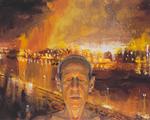
Susanna Coffey
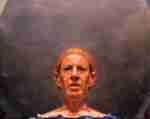
Susanna Coffey: Self Portrait (Cassandra will), 2003, oil on board, 12 x 14 inches
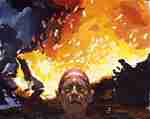
Susanna Coffey: Self Portrait (eris), 2003, oil on panel, 12 x 15 inches
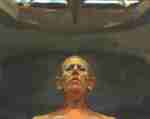
Susanna Coffey: Self Portrait (cloudy), 2002 oil on panel, 12 x 15 inches
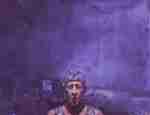
Susanna Coffey: Conveyance, 2003, oil on linen, 27 x 36 inches
Critic Michael Fried has defined "absorption" as a theme of modern painting, meaning the portrayal of a figure lost in inward awareness, oblivious to the spectator. Susanna Coffey's new paintings, exhibited at Tibor de Nagy Gallery, extend this concept. In them, Coffey develops her series of frontal self-portraits, which usually include just her head and an empty background space. Until recently, these have involved variations in head-gear, make-up and expression, but now the artist portrays her head with eyes closed, as though meditating, and behind it an image of the bombing of Baghdad. It could be a large television screen, or just a projection of her state of mind, by which she engages the viewer in her state of "absorption".
On their intimate scale, Coffey's extended self-portraits present the world drama as an internalized image. Her paintings recall Susan Crile's depictions of the oil fires in Kuwait, completed after the first Gulf War. Crile, however, actually went to see the destruction, and portrayed it in darkly dramatic, large-scale images. If Crile's apocalyptic fervor inspires a political response, Coffey's meditative presence encourages an introspective turn.
The "projected" image encourages reflection on the hold that television and video exert on our consciousness. As war becomes increasingly a spectacle, Coffey's backdrops of televised destruction portray its fusion with our visual imagination. Other commentators have noted that the war coverage often seemed an extension of video games and movies; it's become difficult to define a clear boundary between the mass media and our dreams, or between mass media and contemporary art.
The paintings also make more evident some of the distinctive traits in Coffey's use of paint. Something in her sensibility refuses to transform or romanticize paint -- her images retain a literal quality in their material presentation, a bit like those of Lucian Freud. In the background images here, which resemble abstract expressionist paintings, there's a similar literalness to some passages. Coffey resists the virtuosity that would turn paint into something else (flesh, a sky) as well as the virtuosity of "pure painting", that elevates paint to some aesthetic realm. Along with her modest insistence on the everyday features of her face comes a matter-of-fact presentation of paint as paint. As she does in her subject-matter, Coffey confronts us and makes us think.
Text copyright © 2004 Hearne Pardee
 back to Contents page
back to Contents page